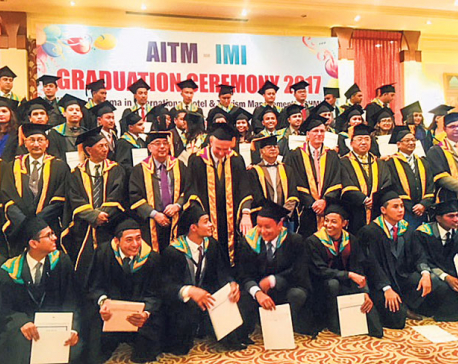
OR
Career advices from the Bhagvad Gita
Published On: October 4, 2016 08:56 AM NPT By: Republica | @RepublicaNepal

The Bhagvad Gita is an ancient Hindu text, a commentary by Lord Krishna to the warrior-prince Arjuna, on the battlefield of Kurukshetra. Innumerable scholars and even stalwarts in the corporate world, refer to this text even today. Be it for religious reasons or hardcore professional guidance, here is a text that has stayed relevant and stood the test
of time.
Here are few verses from the holy book and their real world explanations. You may carry these words in a tiny compartment of your office laptop bag and refer to them every once in a while to truly become relevant and have an impact on your everyday life. Else they are just words that sound like faraway speeches from another time.
Verse #1
To action alone hast thou a right and never at all to its fruits; let not the fruits of action be thy motive; neither let there be in thee any attachment to inaction.
There is no substitute to hard work and eventually hard work pays. Here, we learn the valuable lesson of letting go of the results and not allowing that to dictate our attitude towards our work. While this doesn’t mean we need to be martyrs, it means often the result becomes so much of a focal point; it can turn into a distraction. This detachment from the result also protects us from the disappointment that we are bound to feel at one point or the other in our professional lives.
Verse #2
A person whose mind is unperturbed by sorrow,
who does not crave pleasures, and who is
completely free from attachment, fear, and anger,
is called Sthita-prajna - a sage of steady intellect.
This is one of the hardest verses to put into practice. Here Krishna talks about an amazing leadership quality. While this needs to be practiced in all aspects of life, at work it is imperative to become Sthita-prajna - steady and unwavering. Be it a professional failure, unfair politics at the office or uncooperative team members, this quality of equanimity helps us to look at the circumstance as a situation and not a problem. With this clarity of thought, we can talk clear decisions, keeping our emotions to one side and responding (not reacting).
Verse #3
Just try to learn the truth by approaching a spiritual master. The self-realized soul can impart knowledge unto you because he has seen the truth.
Here, consider the ‘master’ as a professional mentor and also a way of saying don’t stop learning - ever. To grow in our careers, we should seek a mentor who is also focused on our growth. Seek someone who is already on the path and has achieved where you hope to be one day and epitomizes values and skills important to you. Don’t forget to return the favoring by mentoring someone.
Verse #4
Sometimes the mode of goodness becomes prominent, defeating the modes of passion and ignorance, O son of Bharata. Sometimes the mode of passion defeats goodness and ignorance, and at other times ignorance defeats goodness and passion. In this way there is always competition for supremacy.
The Gita talks about three qualities: Sattva, Rajas and Tamas. These are predominant in each of us in different measures and dictate our actions and thoughts. It reminds of the saying:
“Great minds discuss ideas; average minds discuss events; small minds discuss people.”
Good leaders and workers need to root themselves in positive thoughts and ideas (Sattva), slowly rising from Tamasic thoughts (laziness, lethargy) to Rajasic thoughts (highly dynamic and action-oriented). Great leaders and effective CEOs are essentially
Sattvic - steadfast and non-temperamental. They are rooted in thoughts larger than themselves like the welfare of their team, company, employees and customers. As their influence grows, they are visionary thinkers with an impact on society as well.
Even as we step into office today you will see - is your colleague who handles events, restless at his desk, ready to spring into action, dominated by Rajasic tendencies - as his role demands? Notice the Vice President of a department as he silently delegates jobs, unperturbed but actively ideating strategies for growth of his company, closer to the Sattvic qualities of calm-action.
Our growth in our careers is dictated by the choices we make - like how we react to failure and success. Are we swayed by temptations of power and authority or maintain equilibrium of thought? Do we have the bigger picture in mind when we go to office every day? Are we looking at personal growth or just fatter wallets? These pointers are only the tip of the iceberg.
Linkedin.com
You May Like This

Career building in Hotel Management
KATHMANDU, Nov 2: The Asian Institute of Technology and Management (AITM) organized a graduation ceremony on Wednesday at Radisson Hotel, Lazimpat. Read More...

Tips for making a big career change
If you’re feeling dissatisfied at your job, it can be tempting to consider changing careers altogether. ... Read More...

Is your Google identity helping or hurting your career?
Your Google results paint a picture of who you are and reveal how visible you are on the web; and... Read More...






Just In
- ACC Premier Cup semi-final: Nepal vs UAE
- Sindhupalchowk bus accident update: The dead identified, injured undergoing treatment
- Construction of bailey bridge over Bheri river along Bheri corridor reaches final stage
- Taylor Swift releases ‘The Tortured Poets Department’
- India starts voting in the world’s largest election as Modi seeks a third term as prime minister
- EC seeks cooperation for free and fair by-election
- Bus carrying wedding procession attendees meets with accident in Sindhupalchowk; three killed
- CPN (Unified Socialist) to hold its Central Committee meeting on May 10-11













Leave A Comment